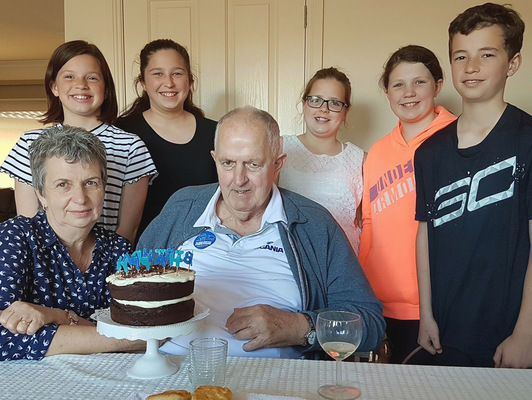
By Bonny Burrows
For former truck driver Dallis Kendall, it started with the little things – confusion and a few mistakes when making deliveries.
His family never expected it to be dementia.
Aged 59 at the time, Mr Kendall was diagnosed with younger onset lewy body dementia after a trip to a neurologist.
Lewy body disease is caused by the degeneration and death of nerve cells in the brain.
It differs from Alzheimer’s disease in that the progression of the disease is usually more rapid. However, like Alzheimer’s disease it is a degenerative condition, eventually leading to complete dependence.
Mr Kendall’s case was diagnosed as younger onset dementia as he was less than 65 years of age.
Wife Tina Kendall said the diagnosis came as a shock.
“It was a complete surprise, there’s no history in the family and we didn’t even know what it was,” Ms Kendall said.
“Things were busy and we don’t notice the little things, the little changes.”
What followed was a complete change of lifestyle.
Mr Kendall could no longer work as he was unable to drive, and Ms Kendall also retired to care for her husband fulltime.
They moved from their family home of 30 years into a new town and had to get their affairs in order.
Aged 62, Mr Kendall was diagnosed with Parkinsonism, a form of Parkinson’s disease which affects movement, further adding to his difficulties.
A couple of days after his 65th birthday, Ms Kendall made the tough decision to admit her husband to a Kooweerup nursing home.
Ms Kendall resides in a nearby unit within walking distance and visits the home every day.
“It was very hard to make that choice, but it’s a wonderful home,” Ms Kendall said.
Mr Kendall’s memory, especially his long-term memory is good, but he gets confused and cannot walk or stand.
“He can’t tell you what day it is or what order to put his clothes on but he can tell you what happened 20 years ago,” Ms Kendall said.
“He can’t make decisions; he’s just not capable of having a clear thought process.”
Sadly, while every dementia case is different, on average people with lewy body disease live for seven years after the onset of symptoms.
Mr Kendall was diagnosed six years ago, but Ms Kendall is determined to make the most of whatever time they have left.
For Ms Kendall, it’s about making life for husband as normal as possible.
They are regularly visited by their grandchildren, who don’t know their “true” grandfather.
“It’s heartbreaking for our children, our grandchildren. They’ve only seen poppy when mixed up and confused, they don’t know what a good grandfather he would be,” Ms Kendall said.
Ms Kendall said the local community had been very supportive.
“People are very accommodating, very good. The grandchildren go to St Johns, and the school’s organised for Dallis to attend a dress rehearsal of the school play, so he doesn’t have to miss out,” Ms Kendall said.
Kind actions such as these made all the difference in making the most of the time they’ve got left, Ms Kendall said.
“My aim is to make him safe, well looked after and happy and hopefully that’s what I’ve done,” she said.
September is Dementia Awareness Month and Alzheimer’s Australia is encouraging Australians to learn more about the condition which affects 1191 Cardinia Shire residents.
Visit www.fightdementia.org.au to find out more.






